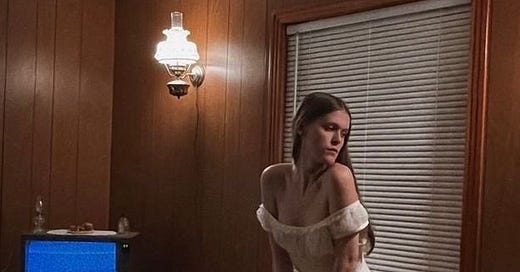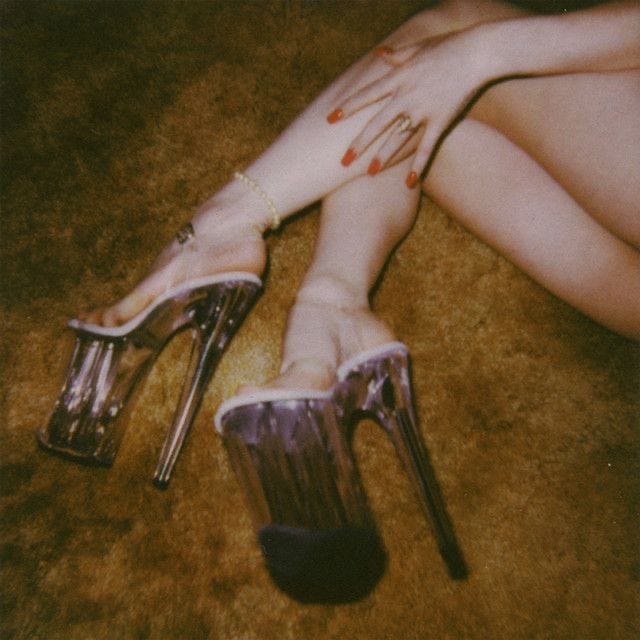American Epic: Ethel Cain’s “Gibson Girl”
Navigating the silky siren song and victimhood within Ethel Cain's journey
The darkness of Southern Baptist culture in rural America has guided artist, Hayden Silas, through creating a hero’s journey in her album “Preacher’s Daughter” through her character Ethel Cain. In a heavily religious and abusive household, the shadow of Cain’s father–the town preacher– is cast on the whole family and continues to haunt Cain as she escapes. Within this American gothic tale, Ethel Cain falls in love with a boy who ends up pimping her out when both their funds run dry leaving Cain to be the only way to make money. In the song Gibson Girl, Ethel Cain explores the blurring of the lines between love and abuse– a story that seems all too familiar to her– as she begins to remember her past.
The title of the song echoes a picture of the famous “Gibson Girls” archetype: the personification of beauty, the ideal woman within the Industrial Revolutionary period in America. To be a Gibson Girl also meant the promise to be perceived: every curl in classic dark hair, every curve within a whalebone corset, every stitch of red lips smiling. This is the American version of the Greek goddess Aphrodite, to be a Gibson girl is to be heavily desired, and this promise does not change with Ethel Cain. As the song begins, the instrumental leads with a Western-like tone being set, instruments imitating a Western showdown beginning to commence, but this is a different type of power struggle without the need for weapons. Ethel Cain enters in, singing:
You wanna love me right now
You wanna get alone with me
You wanna get my clothes off
And hurt me
You came alone to me
From however far away
Asking me to know how I know
You're all the same
Black leather and dark glasses
Pourin’ another while I shake my ass
He’s cold-blooded so it takes more time to bleed
Within this opening line, there is a conversation being had between Ethel and a client, but she is taking the reins, however much she can. She states what is and is going to happen within this transaction all the while preparing for the inevitable ‘hurt’ she will feel. Ethel knows the power she has over these men– knowing they want her and are even willing to go miles to be with her– but also is aware of the stripping of this power when the act begins. This is not Ethel’s first rodeo, as the last line shows the cold reality of Ethel having been pimped so much more than the audience was aware of; there is a numbness in the words ‘you’re all the same’, painting a picture of the number of times Ethel has done this, knows what her clients want, and what they are willing to do to get there. Within the next line, it shows even the details that all her clients display, straight down to the wardrobe choices, their taste in sexual pleasure, and even the inhumane nature they all carry within the words ‘cold-blooded’. She then proceeds to explain her situation, and how she’s ended up here, explaining:
Obsession with the money, addicted to the drugs
Says he's in love with my body, that's why he's fucking it up
And then he says to me
"Baby, if it feels good
Then it can't be bad"
Where I can be immoral
In a stranger's lap
The music has harsh beats, hammering the facts of her reality: her lover is pimping her out due to drugs and money. He tries to calm Cain down, saying he loves her body– this diction implies that he only loves her body, not her as a person. A cause and an effect is happening within this sentence: because he loves her body, that’s why he’s fucking it up. The word ‘fucking’ can mean the act of sexual intercourse–which would mean that’s why her lover is honoring it– or it can also have the connotation of destruction or ruin, meaning because of his love for her body that is why he’s abusing it. Within the sound of the lyrics, the last word of the line, ‘up’, is drawn out at its ‘u’ sound, causing an out-of-breath, rhythmic, seductive tone. This line demonstrates how hard he is working her, even being pimped out in the midst of this song; another client is at her door, one after another, and there is no end in sight. The music halts at ‘Then he says to me’, her attention is immediately, and purely on her lover in the middle of this work; he conveys a secret she did not know: if it feels good, then it can’t be bad. This line exemplifies the main theme of the song, her lover now blurring the lines between love and abuse. By the act of sex feeling good to her, then it is not abuse, relinquishing him of the blame of abuse. This puts the burden of blame from him to Cain herself: it is now her job to find joy in this abuse. She begins to rationalize this notion, even finding hope in ‘being immoral in a stranger’s lap’: this line reveals her past a bit. Within interviews about her album, Hayden reveals the sexual abuse her character Cain was subject to by her father, the preacher. Psychologist Lenore E. Walker suggests this is indeed the cycle of abuse, within this line, there is a hope to heal from her past and to break this cycle by continuing to go down this path. There is something almost religious about this cycle, a faith in a sin being forgiven if Cain keeps obeying. By her lover promising there to be some type of forgiveness from the abuse, she takes it upon herself to go on; within these moments with her clients she engages in the moment of abuse continually, trying to find the power by finding the pleasure. This is reflected even in the sound and tone of the song: that old electric guitar with a slow rhythmic beat, soft crashing of cymbals, even her soft breathy voice, everything drips in sex. The song itself lets the listener experience the process in which Cain is going through: the music being so good, but the lyrics so bad. The music crescendos at the very end, Cain begins to command:
You wanna love me right now
You wanna love me right now
You wanna fuck me right now
You wanna—
You wanna love me right now
You wanna love me right now
You wanna fuck me, fuck me
You wanna love me, love me
You wanna—
There is a desperation within this climax, her talking bit that she does for clients has now hastened as she sings ‘You wanna love me right now, you wanna fuck me right now’. Instead of the explanation there is at the beginning of the song within the first line, there is a rush to get to the act. This is not to get it over with but to quickly commence the forgiveness she so desperately desires. To find pleasure within each of these men is to regain power the moment she lost it to her father long ago. “If it feels good, then it can’t be bad” is a stinging hope that she now grips close to her heart. The constant repetition of these lines mirrors the number of clients she is now going through, the cycle of abuse continuing and her lover is making more money. In the middle of the stanza, ‘You wanna–’, there is that ragged, distorted moaning… Cain has found her forgiveness, but she must go on to find more. Cain’s commands continue within each bit she gives each new client, even becoming short with them within the lines, ‘You wanna fuck me? Fuck me. You wanna love me? Love me.’ painting a picture of Cain’s state of distress; even after escaping Christianity, there is a new religion she has found to beg to become clean. The pattern continues even in the lyrics as it fades out of the song but cuts at the lyric ‘You wanna’, suggesting that this cycle will continue even if the song ends.
Within Ethel Cain’s song Gibson Girl, the audience goes through the beginning of the belly of the beast in her hero’s journey. The blurring of the lines between abuse and love is demonstrated through sound, tone, and lyrics as her character grapples with her past that she cannot forgive. This new American epic showcases the complexities of abuse, religion, and American culture within one teenage girl trying to find her way to forgiveness and happiness again.




